CHINESE NEW YEAR 2021 – 12th February 2021 – How we celebrate the year of the Yin Metal Ox (Xin Chou)
© Written by Daniel Hanna 2020

Are you prepared for 2021?
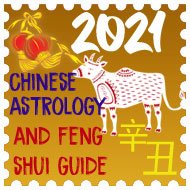 |  | 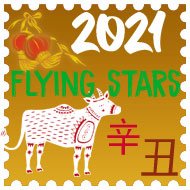 | 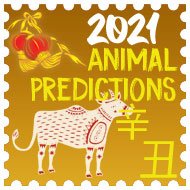 |
CHINESE NEW YEAR 2021 – 12th February 2021 – How we celebrate the year of the Yin Metal Ox (Xin Chou)
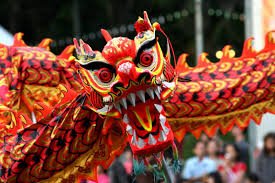
In 2021, the Lunar Chinese New Year will begin on the 12th of February; this is the date that Is celebrated all around the world with friends and family and Is filled with deep-rooted traditions and festivities.
The Lunar Chinese New Year is very much a time of honouring family and friends, both past and present. The New Year is also a time to show gratitude for everything you have in your life and to start fresh and rid yourself of any negativities that took place over the past year; this is a celebration of everything good in the world and a chance to start fresh over the upcoming year ahead.
During the run-up to Chinese New Year, you should look back and reflect upon your mistakes and failures of the previous year and let it all go with the understanding that the New Chinese Year is a symbol of new starts and opportunities to improve on your previous experiences.
In the weeks before the 12th of February 2021, you should take the time to go around your home and workplace organise and deep clean the entire home, shop, or office as this signifies a fresh start for all occupants of the building.
The majority of actions you take and the way you do them will usually have some sort of meaning behind them during Chinese New Year, so it is vital to do things correctly; sweeping the floor of your home with a broom symbolises brushing away any ill-fortune or regrets in life and a deep clean is to allow new, fresh Qi to enter your home or office and lift spirits for the year ahead.
Lunar Chinese New Year is a time of grand, lavish celebrations with your family and friends and is usually based around a large family reunion dinner with beautiful food and green tea! Another main focus of Chinese New year is the elaborate Dragon processions, fireworks and the giving of Ang Pow’s (lucky red envelopes).
It is quite common for the Lunar and Solar Chinese New Year to get mixed up with each other. These two dates have very different purposes.
Solar Chinese New Year: the date that you celebrate – 12th February 2021
Lunar Chinese New Year: the date that you place your annual Cures and Enhancers – 3rd February 2021
For information on the Lunar New Year and the 2021 Flying stars, you will find full details on THIS LINK. 2021 is an important year with regards to the Flying stars as we have the annual #6 wealth star in the central palace and we will need to treat this area correctly to ensure that this good energy permeates throughout the rest of the home or office and helps to enhance the rest of the building. When activated correctly, this star can bring wealth and career luck to all occupants.
The Lunar Chinese New Year Day (25th January 2020) is very different from the Solar (Hsia) New Year Day, which falls on February 4th 2020, which I will explain below.

What happens during Chinese New Year?
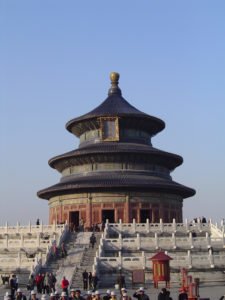
In my family, Chinese New Year has always been a time of most of my favourite things in life; amazing food, spending quality time with family and friends, and in my younger years, receiving Ang Pow’s from older relatives and family friends! These days, my wallet takes a bit of damage as I’ve got three nephews and two nieces.
Chinese New Year has also been a time of less exciting activities which I would dread in my younger years; tidying my bedroom and getting rid of my old, broken toys. In my older years, I’ve learnt to enjoy cleaning the home and get a huge feeling of accomplishment when the task is done, and everything is in order, although it doesn’t always stay that way after the Chinese New Year for too long.
I always look forward to watching the famous Dragon and Lion dance where you would throw lettuce into the lion’s mouth; this is one of my oldest memories of Chinese New year, celebrating at a restaurant in Buckingham with my parents, brother and family friends with everyone trying to get the lettuce in the Lion’s mouth.
Later in the evening, we would go outside and watch the firecrackers light up and spray paper casing all around the ground; it has always been one of my favourite parts of Chinese New Year from a young age.
Although the solar (Hsia) calendar commences the New Year at the beginning of Spring, which usually falls between the 3rd and 4th of February, the lunar (Yueh) calendar marks the New Year on the second new moon after the winter solstice. Celebrations and festivities for the Chinese New Year are held on this date. In 2021, the Lunar Chinese New Year, which also known as ‘Spring Festival,’ falls on the 12th February 2021.
When is Chinese New Year 2021?
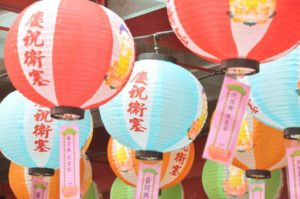
The date that you would celebrate Chinese New Year in 2021 is on the 12th of February; this is when you would celebrate with your family and loved ones and take part in the ancient festivities and traditions.
In recent years, I have seen Chinese New Year become a lot more popular around the world and it is always lovely to see people from all walks of life celebrating. When I get the chance, I will go up to London and walk all around Leicester square, Chinatown and Trafalgar square on Chinese New Year as its amazing to see the celebrations and everyone enjoying themselves.
Some people think that 2021 will be the 4718th Chinese New Year which is not true; the Yellow King’s appointment was held in the spring of 2697 B.C. although they used the winter solstice day as the first day of the year. The first winter solstice took place around the 23rd of December 2698 B.C. Todays January 1st means nothing to the yellow king. If we count the extra eight days in 2698 B.C. for a year, the year 2021 will be the 4719th Chinese New Year.
Interesting Facts for Chinese New Year 2021
The Chinese name for the Metal Ox: Xin Chou
Oxen Years: 1937, 1949, 1961, 1973, 1985, 1997, 2009, 2021, 2033
Best careers for the Ox: Mediator, Judge, Police force, Working with the land, Referee
The personality of the Ox: strong, hard-working, determined, reliable, faithful
Famous Oxen: Alan Titchmarsh, Wayne Rooney, Barack Obama, Adolf Hitler, Lily Allen, Bill Cosby, Charlie Chaplin, David Blaine, George Clooney, Walt Disney, Bruce Springsteen, Anthony Hopkins, Jim Carrey, Ricky Gervais, Gwyneth Paltrow, Lionel Richie, Vincent Van Gogh, Meryl Streep, Keira Knightley, Michael J. Fox
Ox Protection Animal: Rat
Ox conflict Animal: Sheep/Goat
Auspicious Months for the Ox in 2021: July and September
Auspicious Flowers for the Ox: Peach Blossoms, bamboo, tulips
Auspicious Numbers for the Ox: 1, 4
Auspicious colours for the Ox: Green, yellow, white
Auspicious Directions for the Ox: North, South
How do I prepare for Chinese New Year 2021?
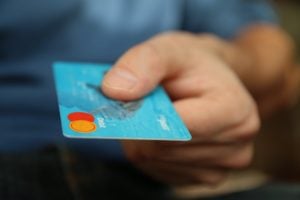
The best time to start preparing for Chinese New Year 2021 is early! There is a lot to do during the build-up to Chinese New Year and it can soon catch you out if you don’t take steps early on and an early start on preparing will give you the opportunity to begin the Chinese New Year feeling stress-free and prepared. It is believed that however we start the New Year will dictate our mood and energy for the rest of the year so please do not start the year rushing and worn out!
Starting the New Year with a positive start will relate to all areas of your life so it is wise to settle small debts before the New Year and also settle any disputes and return and collect borrowed items as this will help you start the year of the Ox off with a good start.
A lot of the general rules for Chinese New Year are common sense in that you should enter the year as you wish to go on –
- Avoid drinking too much alcohol
- Try to repay debts
- Avoid swearing or arguing
- Make amends with others before the New Year
- avoid breaking anything
- Try not to hurt yourself

- Every Chinese New Year, I’m faced with a long list of jobs that need doing around the home and office to make sure that everything is clean and prepared for the upcoming year. It is believed that a clean home, office, shop or any other building has been cleaned of any stagnant, stale Qi (energy) that the home has accumulated over the past year and creates a fresh and clean environment that will attract fresh Qi to enter your home. Please make sure that your windows and doors are clean and free of clutter before Chinese New year as these are the main entrances for Qi.
Another rule to follow is to dispose of any damaged or broken items around the home or workplace; try to get rid of any chipped cups or plates and repair anything that you wish to keep although I do not follow this rule when it comes to something that has sentimental value or has been passed down to me.
To make this process a bit easier, I designed a Chinese New Year Checklist for everything that needs doing in my home and office before Solar Chinese New Year (12th February 2021). This checklist is available for download by CLICKING HERE.
I’ve finished cleaning my home, now what?

Once I’ve finished cleaning and sorting out my home, I make sure that the last area that is cleaned away is the actual cleaning equipment and where it is stored. Please remember to pack away and tidy your broom, dustpan, hoover, cloths and all other equipment. Change the bag on your hoover if it has one and wash the cloths before putting them away, out of sight as they can accumulate a lot of negative Qi.
One important part of the Chinese New Year is the use of colours around the home and office. The most common colour associated with Chinese New Year is the colour red and you will usually see this used all around the home to promote luck, fame, and good fortune for the year ahead.
If used correctly, red can give excellent results, so a good tip is to keep the colours you choose to use as natural as possible unless you are confident of the elements and their associated colours and usage in Feng Shui. Please take a look at our 2021 Flying Star Analysis to find out where red can be used in 2021.
Protective talismans

Protective talismans Also play a critical role with Chinese New year and are used to ward off evil forces and keep it away over the year and should be placed around your home, office or workplace throughout the year of the Ox. (click here to find out why you place these talisman charms and also to download a free printable copy). These auspicious and powerful protective talismans and couplets will be placed in buildings all around the world to bring good fortune and keep the occupants safe; the talismans will be printed on thick paper or card in red print or will have a red background as this colour is seen as a life-giving colour in Chinese culture and is associated with summer, the south and the vermilion bird (similar to the phoenix) and also represents the fire element.
The use of Flowers and plants during Chinese New Year

Flowers and plants also play a very important part in the preparation for Chinese New Year and it is common to find bright, live, fresh and healthy blooming plants and flowers around the home or workplace during Chinese New Year as this is seen as a symbol of rebirth and new growth. The most commonly used plants used will usually be bamboo, peonies, plum blossom and chrysanthemum as they all symbolise wealth and high position in a person’s career.
It is believed that a lack of flowers in your home or business during Chinese New Year will result in a lack of fruit during the year ahead, making this an important item to have in your home on Chinese New Year. Apparently, if you have a plant bloom inside your home or office on New Year’s day, this will bring extremely powerful luck to the home and all of the occupants for the rest of the year.
The use of Fruit during Chinese New Year
Certain fruit is placed around the home during Chinese New Year and will typically be placed in the kitchen; you should place a bowl of fruit (oranges are great) in even numbers on your kitchen or dining table. When placing fruit in your home for Chinese New Year, you should place the fruit in even numbers and the best number of fruit you can place is eight as this is an auspicious number in Feng Shui. The smell of fresh citrus fruit around the kitchen is very significant in our household as we associate this smell with the promise of a New Year ahead. The colour orange is associated with gold and is also a prominent colour during Chinese New Year, along with red decorations.
Kitchen God
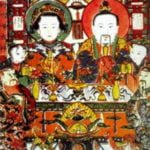
About a week before Lunar New Year, traditional families will be very busy preparing the religious ceremony which is performed with tributes and offerings in honour of Heaven (Tien Shen) and Earth (Ti Tu), and of the various deities of the household together with family ancestors. One of the most well know deities associated with the Chinese New Year is the Kitchen God (also known as stove god).
The Kitchen God resides over the stove and is said to keep an eye on the interactions of the household, making an annual report on what the family has done in the past year to the Jade Emperor in Heaven around about a week before Chinese New Year Day. Rites and offerings are made to the Kitchen God (Zhou Khun) on this day with hopes that he will speak well of the deeds of the family.
The reunion dinner
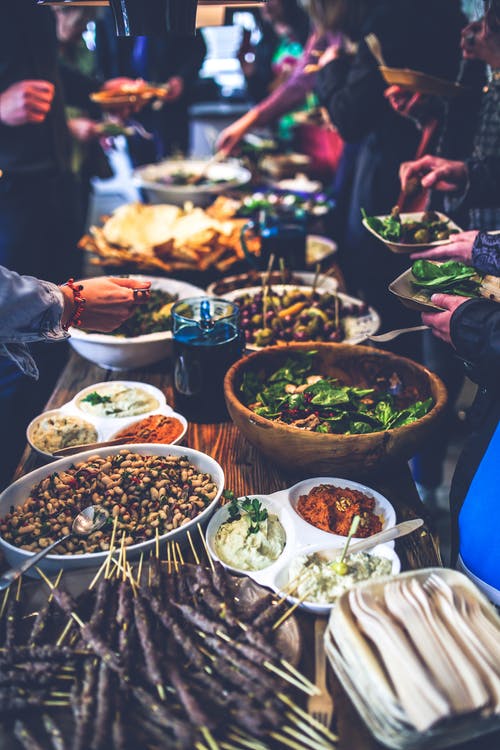
The reunion dinner is the main event during Chinese New Year and is a time of all of the family coming together and sitting down for a large banquet in the family home to celebrate the upcoming New Year. The younger generation will travel back to their parents or grandparents home for the meal as this represents family unity and will usually be a very exciting event for the whole family.
The family will usually travel from wherever they are living to get home to spend time with family during Chinese New Year and similar to Christmas time, flights will usually become more expensive in China during Chinese New Year. Children travelling back to their family home for Chinese New Year is seen as a sign of respect for elders as they are making the journey back home to see family. For a married couple, it is customary for the wife to visit the husbands family home although this is becoming less common and you will also have the husband and wife visiting both family homes or alternating years, similar to Christmas or Thanksgiving.
The dinner table for the reunion dinner will be covered in many unique, beautiful dishes which all bear a different auspicious meaning behind them. At the beginning of the reunion dinner, the family will join at the family altar to give thanks and pay respect by offering a prayer for their ancestors and deities and give offerings to ensure an auspicious year ahead for all.
Most dishes served during the reunion dinner will have a meaning behind them, such as:
- Ginkgo nuts at the dinner table representing gold ingots and are said to bring luck with fertility.
- Black moss seaweed is a visually beautiful dish representing prosperity.
- A whole chicken at the dinner table is seen as a symbol of wealth.
- Dried bean curd is served at the banquet table to promote happiness and luck.
- Lotus seed is also said to increase fertility luck and signifies multiple offspring in the year ahead when eating during the reunion dinner.
- Nian Gao is a traditional sweet, steamed glutinous rice pudding that is said to aid growth and abundance.
- Bamboo shoots will be placed as to when you translate into Chinese; the words sound similar to the Chinese for “Hoping that all turns out for the best”.
- A whole fish with the head and tail still intact will represent togetherness throughout the year.
Before the family sit down for the reunion dinner, the women would traditionally gather in the kitchen to prepare the beautiful dishes while the men will sit together and catch up or watch television although again, this is less common and you will now usually see men and women balancing the duties. A popular activity that takes place before the dinner will be the family playing a game of Mahjong; this game is played by building a wall of tiles and taking turns to form four suits and a pair. Mahjong is considered gambling with huge sums of money exchanging hands between players. You will need a very good memory to master Mahjong as you will need to remember which tiles have been laid down and which remain.
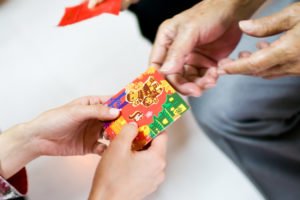
The children will be washed and dressed in their new pyjamas which will be replaced before the reunion dinner. In their bed, with promises that ‘Tsai Shen Yeh’, the wealth god, will arrive once asleep, the children will drift off with the expectation to awake to an Ang Pow under their pillow. The custom of the Ang Pow is very similar to the tooth fairy in western culture.
The younger children will be washed and dressed in their new pyjamas which will be replaced during the lead up to Chinese New Year as this is a sign of new beginnings and growth. With the children in their bed, they will be promised that ‘Tsai Shen Yeh’, the wealth god, will arrive once they are asleep and will wake the next morning to find an Ang Pow under their pillow; this is a similar concept to the tooth fairy.
The children will also usually receive an Ang Pow red envelope from their grandparents and older family members on Chinese New Year. It’s also common for children to receive more money when they get older. Parents will gift more than an aunt or uncle. Someone who has a large family and who has taken a defeat on the mah-jong tables is in for trouble!
At midnight, on the turn of the old and New Year, it is common to hear the loud bang and flash or fireworks in China and around the world. Fireworks are used to ward off evil spirits such as the Nian monster and also symbolises the old energy (Qi) leaving and the welcoming of new energy. Sadly, fireworks are banned in the UK without special permission from the council during this time of year which has seen this tradition fade away over the last 10-15 years although there are many other exciting activities that take place during this event.
Although fireworks have been banned in some countries such as the UK, one tradition that is still going strong is the Dragon dance. At these ceremonies, you will find a group of performers from one to 10 people dressed as a giant dragon, dancing along to the rhythm of deafening music. The performers in the dragon costume will raise and lower a series of poles to make the dragon dance around, chasing the pearl of wisdom. The pearl will serve as a temptation for the dragon to search for wisdom and knowledge as he follows it to the sound of the thundering drums. The drums seem to help fill the void of the firecrackers, the energy is pumping and everyone, old and young, are thrilled by the event.
The tradition of the Dragon Dance during Chinese New Year
The Dragon dance can be dated back to the Han Dynasty (202BC – 22AD) and was traditionally used as a ceremonial practice, offering respect and worship to ancestors and also to pray for rain during the year ahead, bringing fresh and bountiful crops for the village.
These days, the Dragon dance is more commonly known for entertainment rather than a dance of worship and as of the Tang and Song dynasty, this was adopted as a crucial part of the celebrations over Chinese New Year.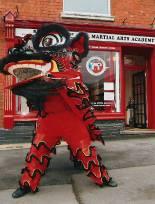
The Dragon dance comes with some interesting practices, and each has a different meaning.
• The body is attached to the head and is known as the ‘eye pointing’ ceremony
• There will be a performer walking in front of the dragon who is holding a long pole with a large ball at the end, signifying the pearl of wisdom and the dragon will follow it’s every move, turning in carefully choreograph turns along the way
• When the dance is finished, the traditional practice is to burn the dragons head and tail and then return the dragon’s body to the dragon king temple. this is believed to return the dragon to ‘dragon heaven’ and bring good weather for crops in the year ahead. A new head and tail would be made at some point in the year, symbolising new beginnings
• Another common belief is that the burning dragon will repel bad luck and disasters for the year ahead.
What does the Lion dance have to do with Chinese New Year?
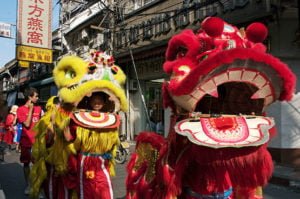
Another beautiful dance that takes place during the Chinese New Year is the lion dance. The Lion dance is also known as the lion lantern and is similar to the Dragon dance although it has a different meaning. The Lion dance is usually done at a smaller scale with two men inside the costume with a mirror on top of the lions head as this is said to scare off evil spirits, dancing down the street to the tune of a drumbeat along with a gong. The dancers inside the costume will imitate the body movements of a real lion and will make careful, pre-planned movements as they go along.
The dancers inside the costume will make their way down the street and will be greeted by another dancer in a laughing Buddha costume, wearing a monks robe and mask holding a fan of banana leaves. The Buddhas role in the dance is to tease the lion by waving the fan in front of the lion’s face, leading him down the street. If you have ever seen a lion dance in person, you will probably remember seeing shredded lettuce all down the street; lettuce will be hung outside homes and businesses outside of the front door with money attached as an offering to both the dancers and also with the promise of new beginnings in the New Year. The lion will reach up to take the lettuce and will keep the money and shred and spit the lettuce over the street; it is said to be very auspicious if the lion takes your lettuce during this dance.
Common practices during day One of Chinese New Year
You’ve probably realised by now that nearly everything that takes place during Chinese New Year bears a special meaning behind it and this also carries through on the first day of the New year.
The day’s celebrations will usually begin with good wishes to other friends and family for the year ahead with everyone meeting up dressed in the new, smart clothes. Family members will then give out Ang Pow red envelopes to the younger generation with money inside to wish them a Happy New Year; unmarried adults will also get a red envelope from aunts, uncles, parents and grandparents on this day. The practice of giving out red envelopes is similar to toys and gifts being given out at Christmas. When giving an Ang Pow, it is considered lucky to give an even sum such as £8 or £20; the amount you give usually depends on the relationship with the recipient. For more information on red envelopes and their use in Chinese culture the link below details http://www.fengshuiweb.co.uk/advice/angpow.htm
Later in the day, the household will usually go out to visit aunts, uncles and other close family and friends. It is common practice to visit family members in order of age, so you would usually start by visiting Grandparents or great Grandparents if they are still alive and then Uncles, Aunts etc to wish them a promising year ahead. Visiting family members is an exciting time for children as they will usually receive an Ang Pow from each family member once they have greeted them with “Kung Xee Fa Chai” which translates to Congratulations and may you be prosperous.
What happens on day Two of Chinese New Year?

The second day of the Chinese New Year is referred to as ‘Kai Nien’ which translates to ‘year beginning’, and you would traditionally begin Kai Nien with a very early breakfast with your family; the whole event of Chinese New Year is very much a family affair!
During the main meal of the day, you will usually eat a range of unique and beautiful dishes that will all have symbolic names and special meaning behind each dish. The main focus of this meal will be based around the main dish which will be a big bowl of long noodles and you would throw them up into the air using your chopsticks to promote longevity in the year ahead. Anyone who is not able to join in with this activity will stay seated and watch the rest of the family stand up and raise their arms, launching the noodles into the air which usually ends with noodles stuck on the ceiling!
During Chinese New Year, alcohol tends to be drunk in small amounts as it is believed that consuming too much Alcohol during Chinese New Year will lead to problems in the year ahead. The main drink that is consumed during Chinese New Year will be large amounts of green tea and small amounts of Chinese Wine; the second day of Chinese New Year is very much a family event and it is not wise to drink to excess during this celebration.
The first two days of Chinese New Year will involve a huge amount of food and also fun and games with family members and can be quite tiring as the Chinese don’t like to hold back during Chinese New Year. The Chinese have a very special relationship with food throughout the year but at no time more so than at New Year. Many of the dishes served during Chinese New Year will hold special significance; even everyday dishes like fish and turnips have special meanings and none more so than fish balls and meatballs, both of which suggest a reunion.
What happens on day Three of Chinese New Year?
After two full days of celebrations and eating, it Is not uncommon to need a rest and this is where the third day of Chinese New Year will bring much-needed rest and relaxation to those celebrating. Day three of Chinese New Year is usually spent taking things easy and the younger generation will usually go out to visit friends or just relax around the home. The tradition is that no offices or businesses will be open on the third day.
What happens on day Four of Chinese New Year?
Things start to get back to normal on the fourth day of Chinese New Year with a lot of companies and shops opening back up for business. A lot of businesses will choose an auspicious date to reopen after Chinese New Year by selecting a good date from the Tong Shu Almanac. Many companies will organise a spectacular display of lion dance and firecrackers. Once again, it’s a booming, boisterous and exciting event for both employer, employees and passers-by. The lion dance on this occasion is said to bring prosperity to the company.
Chinese New Year continued.
Celebrations will actually continue for another eleven days after Chinese New Year right through to the full moon festival of the first lunar month when the ‘Spring lantern festival’ (Yuan Xiao Jie) will take place on the fifteenth day. The impressive ceremony will take place under a full moon.
During the Spring lantern festival, every generation, no matter how old or young will carry a beautiful, colourful lantern and will gather in a public area such as the town centre to admire and appreciate the first full moon of the year; this is similar to the Mid-Autumn festival. In China, there are still villages that hold large Tang Yuan (rice dumplings) cooking and eating sessions which I would love to attend one year although Chinese New Year is an extremely busy time for us. The dumplings are round to symbolise family unity and togetherness. The mid-month spring lantern festival brings the seasonal passage of the New Year to an end.
What can I do before the New Year to achieve good luck?
- Make sure that your house, flat, workplace, shop or any other building is spotless from top to bottom, to encourage good luck in the coming year. On average, just before New Year, we take 2-3 days cleaning every single area of our home, which is quite a time consuming activity but feels fabulous after.
- You should not wash or cut your hair on the first few days of the New Year; this is because “Hair” is a homophone for the word “fa” meaning “prosperity” in Chinese. Therefore “cut the hair” or “wash the hair” is perceived as “cut your prosperity” or “wash your prosperity away”. This is something we have done for as long as I can remember.
- Make sure that you have all of your Cures and Enhancers cleansed and prepared for the 3rd February and be sure to check our world time converter to find out when to place your Cures and Enhancers for 2021, year of the Yin Metal Ox (Xin Chou).
- Depending on weather conditions, it is very good to open all the windows and doors in every single part of the home as this is said to bring in clean, new good luck for the year.
- Avoid talking about death or anything negative on the first few days of the year and, in modern days, horror films or any film with negative connotations would never be watched as this is said to bring negative thoughts in the year ahead.
- Do not purchase books in the first few days in Chinese New Year. “Book” is a homophone for the word “shu” meaning “loss” in Chinese.
- Do not cry on the first few days of the New Year or raise your voice to your children or any other member of your family. It is believed this will set the year ahead.
- You should switch on all of the lights in the home inside and out as this is said to attract good luck from outside and if the windows and doors are wide open it is easy for the luck to enter. The bright lights and open windows are also used to scare away evil spirits.
- Many people, especially Chinese, will buy a new pair of slippers at New Year. It is believed that this purchase will prevent people from gossiping about you. In China, face and reputation are very important.
- This is quite normal all around the earth, but one thing the Chinese spend a lot of time doing before New Year is bathing and they cover themselves with Pomelo leaves to enhance their health for the year ahead. Pomelo is the largest of citrus trees, and they grow as large as a bowling ball and are said to be very healthy to drink and eat.
- The Chinese believe that whatever happens to them on New Year’s Day sets how the year ahead will be for them; this is why they avoid arguments, use knives or drive too far. They love to gamble on New Year’s Day as they hope to create good luck and wealth. You can read more on this below.
Some rules and regulations the Chinese stick to on the Chinese New Year Day
- Everybody is in a celebratory mood over Chinese New Year’s, so, people should not argue or disagree with each other.
- Parents should not punish or discipline the children. Otherwise, they will have more arguments during the New Year. It is common for naughty children to get a telling off quite a few days later.
- Women should refrain from using a knife or scissors in the kitchen. The knife signifies anger and danger in the woman’s life and the scissors predict the woman cutting people out of her life. Women do not prepare or cook meals on this day but eat leftovers and pre-prepared food from the day before instead.
- It is considered bad luck if you smash a plate, bowl, cup or any other similar kitchen crockery; this brings bad luck regarding finances throughout the year. All smashed and cracked crockery should be placed in a round container until the next rubbish collection day.
- If you were to sweep up rubbish or throw away rubbish on Chinese New Year’s Day, you would be sweeping or throwing away the wealth and luck that resides in your home so please don’t do any cleaning.
- Do not take a lunchtime nap on this day as this will encourage laziness throughout the whole year ahead.
- You should not wash on this day which means don’t take a bath, shower or wash your hair on Chinese New Year’s Day as this will wash away all good luck for you.
- Refrain from wearing black or white colours when visiting friends on this day as these colours are associated with funerals and death. Great colours are orange or red.
- Do not eat rice or oat porridge for breakfast on this day as rice or oat porridge is associated with the poor eating these meals in the past; this symbolises a loss of wealth. A good breakfast would be fruit.
- If somebody that you know or know of has recently passed away, it is not advisable to visit a family member’s house that is connected to the recently deceased as this could bring bad luck in 2021.
- Do not eat any meat during breakfast on this day. Many vegetarian Gods arrive at the Chinese New Year’s Day festival and upsetting them could cause problems.
- When you wake somebody up on this morning, do not use their name as it is said that this person will be dependent on you all year long to motivate them.
- Refrain from taking medicine on this day (if possible) that is not essential for your health as this could symbolise weakness and could bring illness to you throughout some point of the year. Necessary medication must still be taken as usual so please do not take any chances.
- Do not wash any clothes on this day as Chinese New Year Day is the birthday of the god of Water.
- Do not collect any debts on this day as you may find that you will be chasing money for the rest of the year of the Ox.
- Do not let anybody take anything out of your pockets, purse, handbag or wallet as this symbolises money loss throughout the year, and please be careful when out as pick-pockets can also cause problems with this.
- Do not cut your hair or nails on this day as it is believed that you will be bringing pain to your relations.
- Do not buy any shoes as it’s considered very unlucky; ‘shoe’ translated in Mandarin means evil and when translated in Cantonese means ‘rough’ although slippers are fine.
- Keep everything positive and do not talk about anything negative on this day as you will be setting an example for how the rest of your year is to be lived.
- When offering something, do not do so in fours; when ‘four’ is translated into Chinese, it sounds like death. An example would be not to place 4 or 24 – 34 04 worse still 44 pounds/dollars in a red envelope
The understanding is that whatever you do on Chinese New Year, is what you will be doing for the rest of the year, so enjoy time with family and eat well.
You can download a checklist of everything that needs to be done, click here Checklist for Chinese New Year 2021
I hope you have enjoyed reading this and would like to wish you all a very happy, successful and lucky new year in 2021. There are many links below related to the Chinese New Year and traditions.
Are you prepared for 2021?
 |  |  |  |
Visit the pages below for further details on 2021 Chinese New Year etc.
Chinese New Year 2021 ** Checklist for Chinese New Year 2021 ** How to make your own Ang Pow **Chinese Talismans for 2021 ** Chinese animal predictions for 2021 ** Flying star Xuan Kong 2021 ** Avoid the fury of the Grand Duke, three killing 2021 ** Chinese New Year world time converter 2021 ** 2021 Cures and enhancers kits ** How to take a compass reading ** How to determine your facing direction ** Feng Shui software ** Feng Shui resource ** 2021 Tong Shu Almanac Software ** Feng Shui Blog ** Chinese culture **










As a non Chinese person I find it very fascinating and interesting what can do to improve my luck and finances I enjoy reading the articles